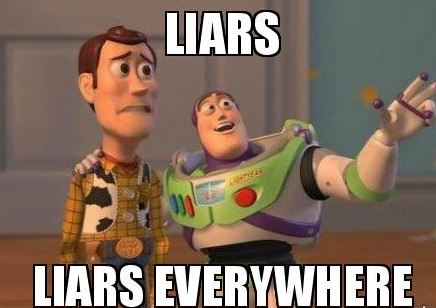Liars, liars everywhere. But then you have to admit that you too have lied sometimes, if not many times. Knowing that someone is lying to you might not be as annoying as finding out a little bit later that you have been deceived. You are upset with your being unable to observe and understand the body language of your conversation partner, how you have missed important clues to what they are really thinking and feeling while talking with you. It feels like you have failed to get the whole truth.
As we might have known, body language is a kind of nonverbal communication where thoughts, intentions, or feelings are expressed by physical behaviors such as facial expressions, body posture, gestures, eye movement, touch and the space bubble (the sense of authority over the “territorial bubble” around you). Understanding body language will help you in many areas of your life and at workspace, especially when you are required to face people with your role as parents, teachers, policemen, or such. There, you will find liars and you have to be able to spot their lies. Below are some steps to spot a liar:
1. Firstly, try to be as empathetic as possible in the conversation, and the chance is you will get the liar to open up more.
2. Liars will try to predict your questions so that their answers will sound honest and natural. Professional liars even practice answering certain questions ahead of time. Ask them questions they do not expect.
3. Liars tend to speak more than honest people in the attempt to sound honest. Using complex sentences can be a sign that they are trying to hide the truth. Stress usually makes people speak faster. Stressed persons often talk louder. Repetitive coughing and clearing the throat are signs of tension.
4. How a person says “No” can be an indication that he might be lying to you. Pay attention on these: Saying "No" and look in a different direction; Saying "No" and close their eyes;
Saying "No" after hesitating; Saying "Nooooo," stretched over a long period of time; Saying "No" in a singsong manner.
5. A subtle change in behavior can be a strong sign of deceit. Pay attention on these: Showing lapses in memory at critical times (despite being alert in earlier conversation). Let’s say that in a sudden he forgest everything; Answering your questions with very short answers, declining to provide more details; Starting to speak more formally (the person is getting stressed); Using exaggerated responses (for example, "awesome" or "brilliant" instead of “good”).
6. When truthful people repeat the story, they tend to add details and remember more facts. On the other hand, liars memorize their stories and try to keep them the same. Rather than forward in time, ask them to recall events backward.
7. Beware of too many compliments. If they are trying too hard to create a good impression, such as are agreeing with all of your opinions, constantly giving praises and laughing at all of your jokes, be cautious.
8. People are uneasy with certain questions due to personal embarrassment, or because they are extremely dependent on the final conclusion. If you are confused, ask some follow-up questions. If you are suspecting that he is hiding the fact of being fired from his previous job, ask the questions like this: "You know, I (or a friend) once lost a job for making a stupid mistake. Have you ever experienced anything like that? How do you think mistakes on the job should be handled?"
9. A smile will not disguise the true feeling as facial expressions will reveal what he is really thinking about. Try to find out if anxiety causes them to blush. Also, flared nostrils, lip nibbling, deep breathing and rapid blinking can also be the clues that you need to spot a liar.
10. Find out if their body language follow the story. Liars may pull their arms and legs inward or keep his movements to a minimum, anything to appear smaller so that, like animals, they can hide from “predators”. Liars often shove their hands behind their back as well as they are afraid if their being uneasy is spotted.
11. Pay attention to how your conversation partner smiles as well as other facial movements. A true smile will incorporate both the lips and eyes.
However, in your attempt to spot a liar, proceed with extreme caution as the body language of a Westerner can be totally different from those of Asian or African persons. Read more articles about various cultures and/or make friends with people of many different cultures so that you can spot a liar effectively.
***
Via rd, inc
Photo: Freeimages,com/Bjorn de Leeuw
Bagikan
How to Spot A Liar Effectively
4/
5
Oleh
Unknown










